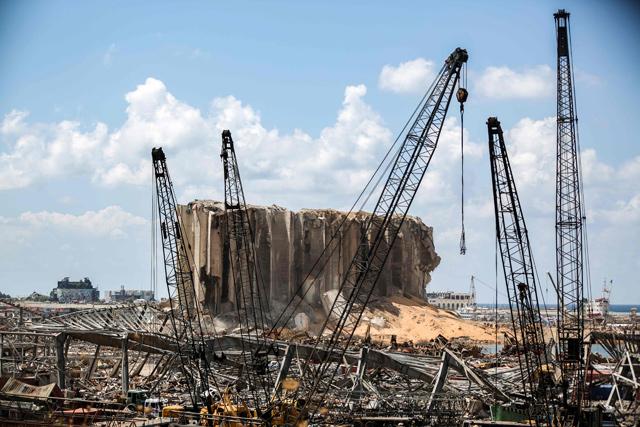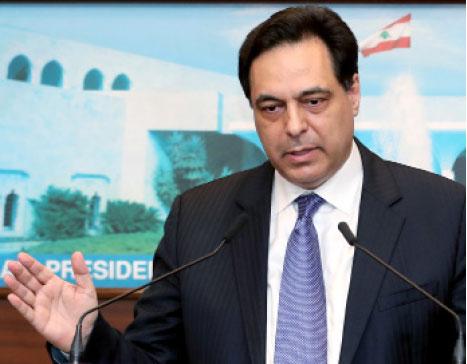You are here
Beirut buries more of its dead as world mobilises
By AFP - Aug 13,2020 - Last updated at Aug 13,2020

Firefighters carry the coffin of their colleague Joe Noun, who was killed in Beirut's massive blast, during his funeral at the fire station in Karantina neighbourhood near the port on Wednesday (AFP photo)
BEIRUT/CAIRO — Lebanon buried more of its dead Wednesday from the huge explosion at Beirut port that disfigured the city, toppled the government and deepened a painful economic crisis.
Top foreign diplomats kept streaming into traumatised Lebanon to show solidarity over its worst peacetime disaster and push for reforms to curb the corruption blamed for causing it.
Survivors and volunteers were still sweeping rubble-strewn streets a week after a large depot of industrial chemicals blew up in an explosion so powerful it was dubbed "Beirutshima" on social media.
The official death toll from the colossal blast that evoked memories of the Hiroshima atom bomb blast rose to 171, while 6,500 were injured and 300,000 left temporarily homeless.
Beirut's main fire station, located a stone's throw from the devastated port, held an emotional funeral for one of the 10 comrades it lost in the conflagration.
"May God be with you, our hero," firefighters cried as they saw off the coffin of their lost friend Jo Noun during their fourth such ceremony since the August 4 disaster.
Ten firefighters are confirmed to have died, and six more are still among the missing, including three members of the same family.
Their relatives have been waiting, in their mountain village of Qartaba, for their return.
“In one piece or several, we want our sons back,” Rita Hitti told AFP. The three missing young men are her son, nephew and son-in-law.
Direct aid
Lebanese and foreign emergency response teams were still searching the dusty “ground zero” where the explosion pulverised buildings and left a water-logged 43 metre-deep crater where a quay and warehouses once stood.
The human error that sparked the kind of wholesale devastation usually associated with a major earthquake has sparked public rage, matched only by the speed at which officials are seen to be passing the buck.
Enquiries made by AFP, and the public comments of Lebanon’s top officials, reveal that the hazard posed by the ammonium nitrate depot had been known for some time at every echelon of the state before the deadly catastrophe.
Around 100 of the wounded were recently still listed in critical condition and it was feared the death toll could yet rise as Beirut’s hospitals, only half of which are operational, kept treating the casualties.
Among those killed was a diplomat from Germany, whose top diplomat Heiko Maas arrived in Lebanon on Wednesday for a short visit of support.
In a social media message before flying out he stressed the need for “profound economic reform”, echoing calls made by French President Emmanuel Macron last week during a high-profile visit to disaster-stricken Beirut.
When he Maas got off the plane, he announced a 1 million euro donation directly to the Lebanese Red Cross, in line with a pledge that emergency aid should bypass a government that has lost the trust of the people.
Hospitals
More than half of Beirut’s healthcare facilities evaluated by the World Health Organisation (WHO) are “non-functional” following last week’s deadly portside explosion, the organisation said on Wednesday.
Following an assessment of 55 clinics and health centres in the Lebanese capital, “we know now that just over 50 per cent are non-functional,” said WHO’s Regional Emergency Director Richard Brennan at a virtual press conference in Cairo.
Three major hospitals were non-functional and another three operating at well below normal capacity, he said.
“That means we have lost around 500 beds,” he added.
He urged Lebanese authorities and their partners to “restore functionality of many of those health facilities as quickly as possible” to help the country deal with both casualties of the blast and a spike in novel coronavirus cases.
Lebanon has so far tallied 7,121 cases including 87 deaths, out of a population of six million, according to the Lebanese health ministry’s tally on Tuesday.
The Eastern Mediterranean country was rocked on August 4 by its worst-ever peacetime disaster when more than 2,700 tonnes of amoninum nitrate exploded at Beirut port, killing 171 people and disfiguring the country’s capital.
Iman Shankiti, WHO representative for Lebanon, said intensive care units and regular beds were occupied by trauma cases following the explosion.
This, coupled with the increase in coronavirus infections, resulted in “deficiency within the ICU and the regular beds in hospitals... which will have an impact on the hospitalisation capacity in Lebanon”, she added.
Jockeying
Angry protesters demonstrated for a third night running on Tuesday to demand the wholesale ouster of a ruling political elite they see as directly responsible for the port tragedy.
Mock gallows and nooses have become the symbols of the new wave of protests, which have rekindled a revolutionary street movement that had lost steam in recent months amid economic hardship and the coronavirus pandemic.
Under intense domestic and foreign pressure, Prime Minister Hassan Diab announced his government’s resignation on Monday. Many citizens bitterly laughed off his efforts to cast himself as a champion of the fight against corruption.
Some saw it as a victory and a sign that continued pressure could force change in a country which has been ruled by the same cartel of former warlords and their relatives since the 1975-1990 civil war.
Others feared that the resignation of Diab’s government could herald the return of old faces, such as former prime minister Saad Hariri.
According to the Al Akhbar daily newspaper, Nawaf Salam, a former judge at the International Court of Justice, is the favoured successor of some of Lebanon’s top foreign partners, including France.
However Salam is not an acceptable choice for the Muslim Shiite movement Hizbollah, which wields most power in Lebanon, the paper said.
A return of Saad Hariri, who resigned under pressure from the street late last year, would be a red rag to a bull for the rejuvenated protest camp.
Parliament was due to convene on Thursday to approve the state of emergency, which would give security forces heightened powers to curb the street demonstrations.
Related Articles
BEIRUT — The Lebanese judge investigating the huge explosion that rocked Beirut in August has suspended the probe after two ministers he cha
BEIRUT — Lebanon's Prime Minister Hassan Diab announced his government's resignation Monday amid popular outrage over the deadly Beirut port
BEIRUT — Lebanon's lead investigator into the catastrophic Beirut Port explosion charged outgoing premier Hassan Diab and three ex-ministers
















